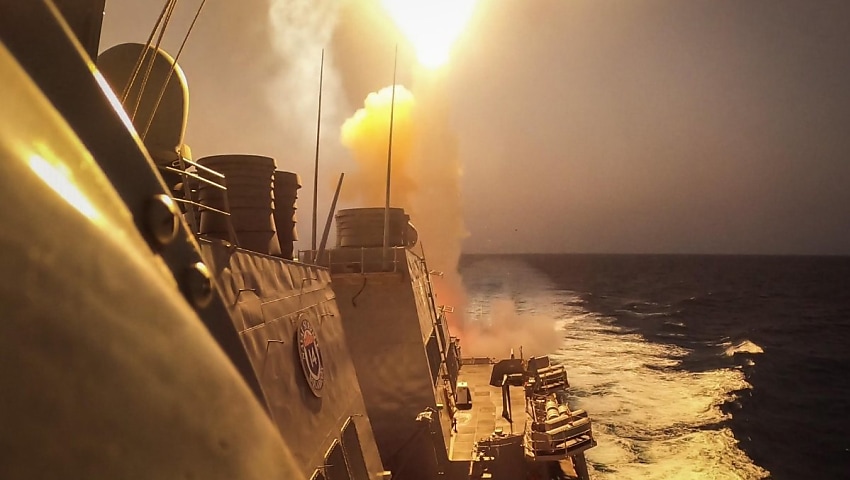The Australian federal government has voiced their support for international partners fighting against Houthi attacks on civilian trade shipping in the Red Sea.
To continue reading the rest of this article, please log in.
Create free account to get unlimited news articles and more!
The joint statement, published on 3 January, from the governments of the United States, Australia, Bahrain, Belgium, Canada, Denmark, Germany, Italy, Japan, the Netherlands, New Zealand, Republic of Korea, Singapore, and the United Kingdom all called for immediate end of the attacks and release of unlawfully detained vessels and crews.
The statement comes in response to an escalation in the number of attacks with unmanned aerial vehicles, small boats, missiles, and in some cases, anti-ship ballistic missiles by Houthi rebels (in Yemen) against commercial trade vessels transiting the Red Sea and Gulf of Aden. The Houthis have declared their intent to fire on all ships heading to Israeli ports, regardless of nationality.
The United States of America has committed three destroyers to Operation Prosperity Guardian, alongside the French Languedoc (D653) FREMM multipurpose frigate, and the United Kingdom’s Royal Navy destroyer HMS Diamond to intervene in the area.
“Ongoing Houthi attacks in the Red Sea are illegal, unacceptable, and profoundly destabilising. There is no lawful justification for intentionally targeting civilian shipping and naval vessels,” the joint statement said on 3 January.
“Attacks on vessels … are a direct threat to the freedom of navigation that serves as the bedrock of global trade in one of the world’s most critical waterways.
“These attacks threaten innocent lives from all over the world and constitute a significant international problem that demands collective action.
“Nearly 15 per cent of global seaborne trade passes through the Red Sea, including 8 per cent of global grain trade, 12 per cent of seaborne-traded oil, and 8 per cent of the world’s liquefied natural gas trade. International shipping companies continue to reroute their vessels around the Cape of Good Hope, adding significant cost and weeks of delay to the delivery of goods, and ultimately jeopardising the movement of critical food, fuel, and humanitarian assistance throughout the world.
“We call for the immediate end of these illegal attacks and release of unlawfully detained vessels and crews.
“The Houthis will bear the responsibility of the consequences should they continue to threaten lives, the global economy, and free flow of commerce in the region’s critical waterways.”
The Australian government has stopped short of committing any maritime vessels, and instead increased the number of Australian personnel embedded in the headquarters of the Combined Maritime Force from five to 16. Australia has not deployed a Royal Australian Navy vessel to the Middle East since the HMAS Toowoomba attended Operation Manitou in 2020.
Australian Deputy Prime Minister Richard Marles said the country will not be committing a warship or plane for Operation Prosperity Guardian.
“We won’t be sending a ship or a plane. That said, we will be almost tripling our contribution to the Combined Maritime Force,” he told Sky News on 21 December.
“Right now, we have five personnel who are embedded in the headquarters of the Combined Maritime Force and over the next month, that number will increase to 16. That is a significant contribution. It’s one which is commensurate with likeminded countries, for example, it’s more than what Canada is providing.
“We need to be really clear around our strategic focus. And our strategic focus is our region in the northeast Indian Ocean, the South China Sea, the East China Sea, the Pacific.
“What comes from the Defence Strategic Review is an urgency around Australia maintaining a strategic focus on our immediate region and that’s what we will do.”
Minister Marles said the contribution is proportionate to Australia’s standing in the world and the size of Australian Defence Force.
“This year (2023), within our region, we’ve seen us have a very significant tempo of activity in the northeast Indian Ocean, in the South China Sea, and the East China Sea,” he said.
“The largest exercise that we’ve done outside of Australia this year was with the Philippines, our first joint sail with the Philippines, we’ve got more naval commitments with Korea, we’ve seen greater interaction with Japan, with Indonesia, more P-8 activity in combination with India.
“This has to be our focus. And this is where we can really make a difference. And to be frank, this is where the international community expects us to do heavy lifting.
“We still have very significant capability within our Navy. This is a decision which is based on where our strategic focus must lie, and it must lie within our immediate region.”
Earlier this week, Australia also farewelled Australian Defence Force personnel departing for the United Kingdom to undertake combat and leadership training of Ukrainian recruits.
Assistant Minister for Defence Matt Thistlethwaite, who attended the farewell, said a bond of solidarity is shared between Ukraine and Australia.
“We will continue to support Ukraine as they defend their homeland against an unjust and illegal Russian invasion,” he said.

 Login
Login







